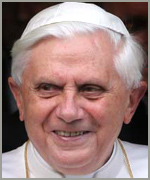I'm afraid that historians (outside the Vatican) will look back on the papacy of Benedict XVI as a series of missed opportunities. Here is a repeat of a post I did in 2010 concerning an open letter by Benedict's fellow theologian and one-time friend Hans Küng. The letter is a catalogue of Benedict's missed opportunities:
On Monday Pope Benedict XVI will mark five years at the helm of a
Roman Catholic Church deep in crisis. I looked at some of my blog posts
from then and found this hopeful piece on
a meeting between the pope and his former friend and collaborator Hans
Küng. I viewed this meeting at the time as a sign of reconciliation and
change. How these hopes have been dashed in the ensuing five years.
Today
Hans Küng published a devastating letter to the bishops of the church
where he urged them to take action. The Open Letter appeared in several
major newspapers, including the Irish Times and the Sueddeutsche Zeitung (deutsche Version hier):
Joseph Ratzinger, now Pope Benedict XVI, and I were the youngest
theologians at the Second Vatican Council from 1962 to 1965. Now we are
the oldest and the only ones still fully active. I have always
understood my theological work as a service to the Roman Catholic
Church. For this reason, on the occasion of the fifth anniversary of
the election of Pope Benedict XVI, I am making this appeal to you in an
open letter. In doing so, I am motivated by my profound concern for our
church, which now finds itself in the worst credibility crisis since
the Reformation. Please excuse the form of an open letter;
unfortunately, I have no other way of reaching you.
Küng then cites the numerous "missed opportunities" of Benedict's tenure thus far:
Missed is the opportunity for rapprochement with the Protestant
churches: Instead, they have been denied the status of churches in the
proper sense of the term and, for that reason, their ministries are not
recognized and intercommunion is not possible.
Missed is the
opportunity for the long-term reconciliation with the Jews: Instead the
pope has reintroduced into the liturgy a preconciliar prayer for the
enlightenment of the Jews, he has taken notoriously anti-Semitic and
schismatic bishops back into communion with the church, and he is
actively promoting the beatification of Pope Pius XII, who has been
accused of not offering sufficient protections to Jews in Nazi Germany.Missed is the opportunity for a
dialogue with Muslims in an atmosphere of mutual trust: Instead, in his
ill-advised but symptomatic 2006 Regensburg lecture, Benedict
caricatured Islam as a religion of violence and inhumanity and thus
evoked enduring Muslim mistrust.Missed is the opportunity for
reconciliation with the colonised indigenous peoples of Latin America:
Instead, the pope asserted in all seriousness that they had been
“longing” for the religion of their European conquerors.Missed
is the opportunity to help the people of Africa by allowing the use of
birth control to fight overpopulation and condoms to fight the spread
of HIV.Missed is the opportunity to make peace with modern
science by clearly affirming the theory of evolution and accepting
stem-cell research.
Missed is the opportunity to make the spirit
of the Second Vatican Council the compass for the whole Catholic
Church, including the Vatican itself, and thus to promote the needed
reforms in the church.
Then comes the serious
indictment of Ratzinger/Benedict with respect to the child sex abuse
scandal that is destroying the church:
There is no denying the fact that the worldwide system of covering up
cases of sexual crimes committed by clerics was engineered by the Roman
Congregation for the Doctrine of the Faith under Cardinal Ratzinger
(1981-2005). During the reign of Pope John Paul II, that congregation
had already taken charge of all such cases under oath of strictest
silence. Ratzinger himself, on May 18th, 2001, sent a solemn document
to all the bishops dealing with severe crimes ( “epistula de delictis gravioribus” ), in which cases of abuse were sealed under the
“secretum pontificium” , the violation of which could entail
grave ecclesiastical penalties. With good reason, therefore, many
people have expected a personal mea culpa on the part of the former
prefect and current pope. Instead, the pope passed up the opportunity
afforded by Holy Week: On Easter Sunday, he had his innocence
proclaimed “urbi et orbi” by the dean of the College of Cardinals.
Under Benedict and his predecessor, the Church was little more than a criminal enterprise that did everying to cover up the massive epidemic of child rape by priests that continues around the world today. Benedict offered only belated verbal apologies and ineffective symbolic gestures concerning the criminal behavior of a "few bad apples", refusing to acknowledge that the root of child rape by priests is the Church's distorted view of sexuality and the requirement of priestly celibacy.



0 comment
Pope Benedict XVI definetely wasn’t a political leader, neither in the church nor in the world. His sensational abdication, however, could be the beginning of a transition to political leadership in the catholic church in future. He gives an example for his successors, he underscores the necessity to keep pace with the requirements of the modern world and networks and the disadvantages of high age. Now, the gates are open for a young and modern new pope. Perhaps Benedicts legacy lies more in the things he didn’t do himself in order to leave them to his successors – if not to say, to force his successors to do it.
What an indictment.
A fact that has generated alarm in the financial world and in the European North Atlantic Treaty Organization, as “the deliberate opacity, and insisted sought by IOR can be a window of opportunity for criminal operations of all kinds, with the risk – reported in its letter from Cardinal Nicora – resulting in a blow to the reputation of the Holy See. “
http://demata.wordpress.com/2013/02/13/vatican-the-battle-of-rome/